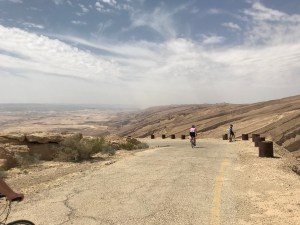Finding solace after Passover
On a 30-mile sunrise trek out of and back into Mitzpe Ramon, my colleague and fellow rider Rabbi Ed Gelb introduced me to the idea of the “solace of silence.” Or was it the “solace of solitude?”
Reflecting on my recent participation in the Ramah Israel Bike and Hike in the Negev (which included 250 miles of biking over 5 days the week before Passover), I sat with my memories of the silence, the solitude and the solace I experienced in the open spaces of the desert. Given the timing of the trip, I was particularly excited to travel along the Jordanian-Israeli border and the Egyptian-Israeli border at the same time of year the Israelites of the Torah would have exited Egypt. Due to this year’s very wet winter in Israel, the Negev was green along the “river” beds that would carry the rains. I was reminded of the words of Psalm 104, which we read just this morning in celebration of the new month: “You make springs gush forth in torrents to flow between the hills.” I imagined the flock that accompanied the Israelites feeding on the greenery, the children picking the purple and yellow flowers. I wondered whether the winter that preceded the exodus was an unusually wet one in God’s anticipation of the challenging journey.
As I rode with my group (we “Bogrim” were the intermediate riders, encompassing a wide range of biking abilities), we’d often get spread out along our route. Sometimes we’d be divided into small packs, where we could push, encourage, joke with, and occasionally sing to one another. Sometimes we’d feel entirely alone on the road, though there was always someone just a minute ahead or a minute behind us.
The moments of community and the moments of solitude in the open and quiet space of the wilderness gave me a new perspective on the Israelites’ journey from slavery to freedom. I’d always understood the desert as a necessary transformational experience for our people, but never fully appreciated the effects of the surroundings on the fledgling community. Barren, silent and expansive, yet beautiful, peaceful and awe-inspiring, the Negev invited me to clear my head, to shed my burdens, to breathe deeply into my faith and to connect at a soul-level with the land, the journey and the people sharing both with me.
Wanting to pursue the topic further, I searched for the book that Rabbi Gelb had mentioned. As it turns out, I had the title entirely wrong. The book he referenced that morning was The Solace of Open Spaces by Gretel Ehrlich, a collection of essays about the author’s life and encounters in Wyoming! My mistake, however, led me to two wonderful blogs. One was about the benefits of practicing silence, entitled “Finding Solace in Silence” by Kerine W. on wittedroots.com. She writes: “There’s always been more to silence than we think. It hasn’t been obvious because we’ve villainized it. We’ve given it negative connotations of loneliness, isolation, and the illusion that we’ll be missing out on all the things around us. I think we too often associate silence with loneliness, but a void filled with noise is still empty. I believe silence is recuperation.”
In the second, entitled “Finding Solace in Solitude,” Zat Rana comments on upliftconnect.com: “When you surround yourself with moments of solitude and stillness, you become intimately familiar with your environment in a way that forced stimulation doesn’t allow.”
Sadly, the events transpiring in the world around us on this new moon challenge our faith and our hopes. We don’t have the luxury of such time in the wilderness when rockets give only seconds to find shelter. And ceasefires rarely yield the silences that bring about the reflection and reassessment required for true transformation.
Then again, maybe a few days off will give everyone a chance to take a long bike ride in the desert. It certainly worked for me.
Rabbi Craig Scheff





Recent Comments